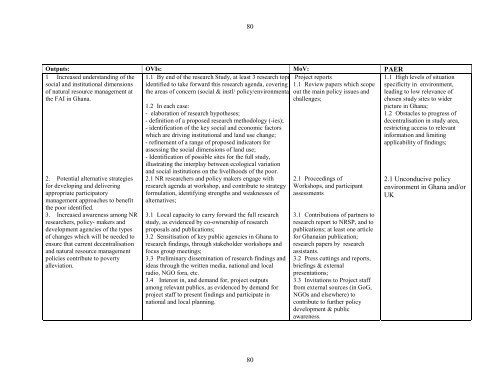Poverty Dimensions of Public Governance and Forest Management ...
Poverty Dimensions of Public Governance and Forest Management ...
Poverty Dimensions of Public Governance and Forest Management ...
Create successful ePaper yourself
Turn your PDF publications into a flip-book with our unique Google optimized e-Paper software.
80<br />
Outputs: OVIs: MoV: PAER<br />
1 Increased underst<strong>and</strong>ing <strong>of</strong> the 1.1 By end <strong>of</strong> the research Study, at least 3 research topi Project reports<br />
social <strong>and</strong> institutional dimensions<br />
<strong>of</strong> natural resource management at<br />
the FAI in Ghana.<br />
identified to take forward this research agenda, covering a 1.1 Review papers which scope<br />
the areas <strong>of</strong> concern (social & instl/ policy/environmental out the main policy issues <strong>and</strong><br />
challenges;<br />
2. Potential alternative strategies<br />
for developing <strong>and</strong> delivering<br />
appropriate participatory<br />
management approaches to benefit<br />
the poor identified.<br />
3. Increased awareness among NR<br />
researchers, policy- makers <strong>and</strong><br />
development agencies <strong>of</strong> the types<br />
<strong>of</strong> changes which will be needed to<br />
ensure that current decentralisation<br />
<strong>and</strong> natural resource management<br />
policies contribute to poverty<br />
alleviation.<br />
1.2 In each case:<br />
- elaboration <strong>of</strong> research hypotheses;<br />
- definition <strong>of</strong> a proposed research methodology (-ies);<br />
- identification <strong>of</strong> the key social <strong>and</strong> economic factors<br />
which are driving institutional <strong>and</strong> l<strong>and</strong> use change;<br />
- refinement <strong>of</strong> a range <strong>of</strong> proposed indicators for<br />
assessing the social dimensions <strong>of</strong> l<strong>and</strong> use;<br />
- Identification <strong>of</strong> possible sites for the full study,<br />
illustrating the interplay between ecological variation<br />
<strong>and</strong> social institutions on the livelihoods <strong>of</strong> the poor.<br />
2.1 NR researchers <strong>and</strong> policy makers engage with<br />
research agenda at workshop, <strong>and</strong> contribute to strategy<br />
formulation, identifying strengths <strong>and</strong> weaknesses <strong>of</strong><br />
alternatives;<br />
3.1 Local capacity to carry forward the full research<br />
study, as evidenced by co-ownership <strong>of</strong> research<br />
proposals <strong>and</strong> publications;<br />
3.2 Sensitisation <strong>of</strong> key public agencies in Ghana to<br />
research findings, through stakeholder workshops <strong>and</strong><br />
focus group meetings;<br />
3.3 Preliminary dissemination <strong>of</strong> research findings <strong>and</strong><br />
ideas through the written media, national <strong>and</strong> local<br />
radio, NGO fora, etc.<br />
3.4 Interest in, <strong>and</strong> dem<strong>and</strong> for, project outputs<br />
among relevant publics, as evidenced by dem<strong>and</strong> for<br />
project staff to present findings <strong>and</strong> participate in<br />
national <strong>and</strong> local planning.<br />
2.1 Proceedings <strong>of</strong><br />
Workshops, <strong>and</strong> participant<br />
assessments<br />
3.1 Contributions <strong>of</strong> partners to<br />
research report to NRSP, <strong>and</strong> to<br />
publications; at least one article<br />
for Ghanaian publication;<br />
research papers by research<br />
assistants.<br />
3.2 Press cuttings <strong>and</strong> reports,<br />
briefings & external<br />
presentations;<br />
3.3 Invitations to Project staff<br />
from external sources (in GoG,<br />
NGOs <strong>and</strong> elsewhere) to<br />
contribute to further policy<br />
development & public<br />
awareness.<br />
1.1 High levels <strong>of</strong> situation<br />
specificity in environment,<br />
leading to low relevance <strong>of</strong><br />
chosen study sites to wider<br />
picture in Ghana;<br />
1.2 Obstacles to progress <strong>of</strong><br />
decentralisation in study area,<br />
restricting access to relevant<br />
information <strong>and</strong> limiting<br />
applicability <strong>of</strong> findings;<br />
2.1 Unconducive policy<br />
environment in Ghana <strong>and</strong>/or<br />
UK<br />
80
















